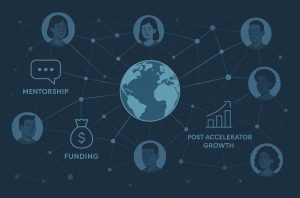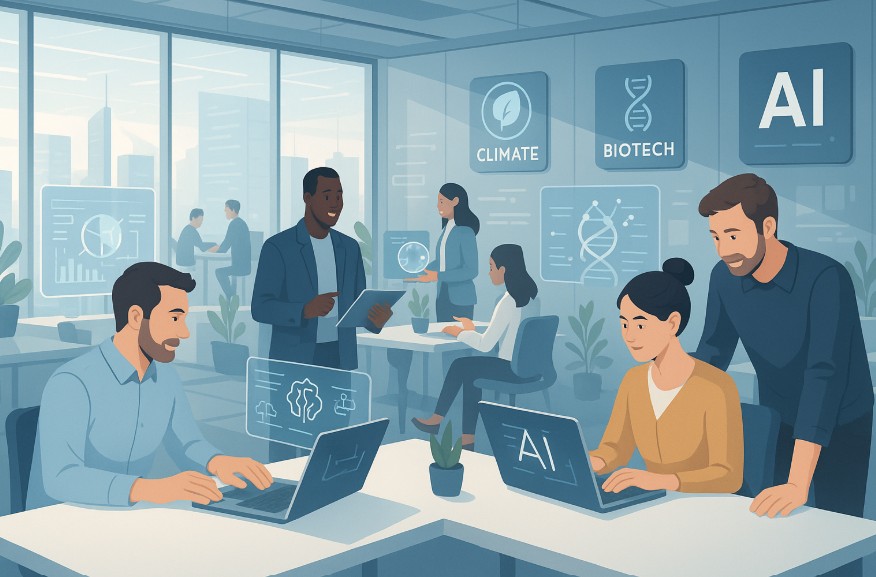Y Combinator’s Request for Startups (RFS) outlines visionary ideas the accelerator is eager to fund, offering insight into sectors it believes are ripe for disruption. For 2025, YC’s focus spans AI, climate tech, biotech, and beyond.
While founders aren’t limited to these themes, aligning with them can offer strategic validation. In this blog, we explore the top startup ideas Y Combinator is seeking across its Winter, Spring, and Summer batches helping UK founders position themselves for success.
What Is Y Combinator’s Request for Startups (RFS) and Why Does It Matter?

Y Combinator (YC), one of the most influential startup accelerators globally, introduced the Request for Startups (RFS) as a way to communicate its evolving vision of the future.
While YC is open to funding all types of ideas, the RFS showcases areas where the organisation believes innovation is urgently needed and offers extra validation for founders.
The RFS serves not as a checklist, but a signal of encouragement. Founders don’t need to stick strictly to these categories, but aligning with one could increase your resonance with YC’s current investment focus.
In essence, if a proposed idea solves a significant global problem or offers a scalable solution with high-impact potential, YC wants to hear from you.
What Are the Key Startup Trends for Y Combinator’s 2025 Batches?
In 2025, YC is continuing its tradition of funding startups through three cohorts:
- Winter 2025
- Spring 2025
- Summer 2025
These batches reflect YC’s commitment to discovering high-potential startups at different stages of the year, and the themes of each cycle evolve based on global economic conditions, technological advancements, and founder interest.
The 2025 RFS themes reflect an emphasis on climate tech, AI safety, biotech, infrastructure tools, and rebuilding the real economy.
YC is particularly interested in startups that build deep tech, rethink legacy industries, or aim to solve urgent global crises such as climate change and healthcare accessibility.
What Are the Breakthrough AI Startup Ideas Y Combinator Is Seeking for Summer 2025?

The Summer 2025 batch of Y Combinator is shaping up to be one of its most transformative yet, especially for startups leveraging the rapidly evolving power of AI agents. YC has flagged this as the “year of AI agents”, with a deep interest in companies that go beyond surface-level applications to create full-stack, disruptive solutions.
Here are some of the key areas YC is actively looking to fund in this upcoming batch:
Full-Stack AI Companies
Jared Friedman encourages founders to think beyond building tools for existing players. Instead of selling an AI legal agent to a law firm, why not create a fully AI-powered law firm? This full-stack approach allows founders to replace outdated incumbents rather than serve them. YC sees potential for this model in nearly every traditional industry legal, real estate, accounting, insurance, and more.
More Design Founders
Aaron Epstein calls on designers to stop worrying about AI taking their jobs and start using AI to launch their own companies.
YC believes that designers have the essential traits for great founders: user empathy, an eye for detail, and problem-solving instincts. With tools now available to ship products faster than ever, design-led AI startups could become the next Airbnb or Stripe.
Voice AI
Gustaf Alströmer highlights the revolution happening in voice interfaces, especially for businesses still reliant on phone-based customer service.
YC is excited about startups building AI-powered voice agents that are indistinguishable from human support staff. With over a trillion calls annually between customers and businesses, the opportunity to transform communication is massive.
AI for Scientific Advancement
Diana Hu points out how industries like materials science, drug discovery, and energy still rely on outdated software. Founders leveraging AI to optimise and accelerate scientific processes, particularly where test-time compute unlocks faster breakthroughs, are highly encouraged to apply.
AI Personal Assistants
Tom Blomfield envisions a future where LLM-based personal assistants do the work, not just organise it. YC is looking for tools that don’t just manage calendars or emails but execute complex workflows autonomously, freeing up founders and professionals alike to focus on high-impact tasks.
Healthcare AI
Alströmer also shines a spotlight on the $1 trillion administrative waste in the U.S. healthcare system. With LLMs now able to extract and structure data from legacy systems, there’s a growing demand for startups creating infrastructure that automates healthcare workflows, lowers costs, and increases efficiency.
AI Personal Tutors
Harj Taggar believes the long-held dream of personalised education is finally within reach. With multimodal AI and deep reasoning capabilities, founders can now build AI tutors that teach like the world’s best educators, tailored to each learner’s pace and style. YC is especially keen to support startups tackling education in new, interactive ways.
Software Tools to Make Robots
Diana Hu stresses that robotics is on the verge of its “ChatGPT moment.” YC wants to fund the picks-and-shovels tools, the software infrastructure that enables others to build intelligent robots for farming, manufacturing, logistics, and beyond.
AI in Education
Tom Blomfield urges founders to rethink how education is delivered and scaled. While AI is starting to impact content delivery and grading, there’s a huge gap in business models and outcomes tracking. YC is ready to back bold education tech startups that bring AI deeper into the learning process, despite institutional resistance.
AI Residential Security
Tyler Bosmeny sees a huge market in replacing outdated home security systems with smarter, AI-driven alternatives. Startups using facial recognition, behavioural analysis, and virtual agents to prevent crime before it happens are of particular interest.
Internal Agent Builders
YC believes that soon, every company will have employees building agents to automate internal tasks. Pete Koomen wants to fund teams developing secure, LLM-powered internal agent builders that integrate with enterprise software and remove repetitive work from HR to finance to compliance.
AI Research Labs
YC is also looking to fund ambitious, open-ended AI research labs that may take years to commercialise. Jared Friedman notes that YC was the first investor in OpenAI, and wants to support the next generation of research-driven AI ventures.
Voice AI Assistants for Email
Bosmeny calls for startups that let people manage emails with their voice, especially for productivity on the go or for users with physical limitations. These assistants would integrate with inboxes, understand communication patterns, and intelligently act on behalf of the user.
AI for Personal Finance
YC sees a powerful opportunity in building tools that give everyday people access to high-quality financial advice via AI. Gustaf Alströmer notes that LLMs can now securely analyse personal financial data and offer personalised, bias-free planning making financial literacy and advisory accessible to all.
What New AI-Driven Startup Opportunities Has Y Combinator Unlocked for Spring 2025?

For Y Combinator’s Spring 2025 batch, the pace of AI development has been so rapid that the accelerator released a new Request for Startups list just three months after the previous one a clear sign of how dramatically the startup landscape has evolved.
This updated RFS showcases fresh problem areas and industries being transformed by AI, offering founders an unprecedented range of opportunities to innovate.
Here are the most exciting startup directions YC is prioritising for the Spring 2025 cohort:
A Secure AI App Store
YC President Garry Tan envisions a new operating system layer, a secure AI app store built around privacy-first principles and shared user memory.
This ecosystem would allow users to control what each AI app can access (like calendars, files, and preferences), while developers gain access to APIs, monetisation infrastructure, and app-level access controls. The vision is a decentralised but secure environment where both users and builders benefit. YC believes this could be the next major computing platform.
Datacenter Innovation
As AI apps demand ever more compute, Diana Hu urges founders to address the bottlenecks in datacenter construction and infrastructure. YC is looking to back startups that accelerate the development of hyperscale data centres, focusing on areas like automation, cooling, energy management, robotics, and supply chain software. The goal? Lights-out datacentres are operated with minimal human intervention.
AI for Compliance and Audit
With millions employed in compliance and regulation, Tom Blomfield highlights a key opportunity to replace manual auditing with AI systems capable of real-time, continuous oversight.
Startups building tools that parse regulations, check data anomalies, and automate internal audits could massively reduce the cost and complexity of compliance across finance, healthcare, and enterprise sectors.
Browser and Computer Automation
Jared Friedman describes how AI agents are evolving to use browsers and desktop applications just like humans, effectively making every app and site programmable through agents.
This unlocks a massive surface area for automation. YC wants to fund tools and agents that turn repetitive web or desktop tasks into automated flows, expanding AI’s reach far beyond chat interfaces.
AI Personal Staff for Everyone
David Lieb sees AI bridging the gap between everyday consumers and services traditionally reserved for the wealthy private tutors, tax accountants, trainers, personal lawyers, and more.
With the right models and integrations, startups can democratise this layer of personalised service, giving everyone access to their own AI-powered personal staff.
Devtools for AI Agents
Nicolas Dessaigne calls attention to the growing demand for developer tools that support agent creation and deployment. YC wants to fund the underlying infrastructure: platforms for building, testing, and deploying multi-step, autonomous AI agents.
Think of this as the DevOps layer for AI-native applications, everything from agent orchestration to memory, security, and API integrations.
The Future of Software Engineering
According to Pete Koomen, LLMs will eventually write code better than most developers, but this doesn’t mean fewer engineers, just a shift in their role.
YC is seeking startups building tools that allow small dev teams to manage fleets of AI agents, each performing software development tasks such as QA, deployment, localisation, and compliance. Startups in this space could redefine the engineering workflow of the future.
AI Commercial Open Source Software (AICOSS)
Dalton Caldwell notes a growing gap between open-source AI tools (like DeepSeek or Meta’s models) and commercial support for enterprises. YC is interested in companies building RedHat-style business models around open-source AI, offering integration, deployment, and support services tailored for large organisations adopting these tools at scale.
AI Coding Agents for Hardware-Optimised Code
Diana Hu highlights a critical bottleneck: custom silicon underperforms not because of poor hardware, but due to a lack of specialised code. YC wants to fund startups developing AI-generated code (like CUDA alternatives) to optimise performance for AMD, ARM, or proprietary chips. These startups could play a crucial role in breaking Nvidia’s stranglehold on the AI hardware market.
B2A: Software Where the Customers Are AI Agents
Dalton Caldwell identifies a novel market: building software specifically for AI agents as the primary users. Whether it’s payment processing, contract negotiation, or infrastructure management, these startups will serve agents as customers rather than humans. Just like APIs revolutionised B2B integration, B2A software could enable seamless transactions between autonomous systems.
Vertical AI Agents
YC believes that the next SaaS wave will be led by vertical AI agents tools deeply embedded in specific industries that automate end-to-end workflows.
Jared Friedman points to recent YC startups that built AI tax advisors, medical billers, compliance bots, and QA testers. These aren’t just “ChatGPT wrappers,” they’re complex systems built with domain-specific logic and integrations. The goal is to replace human labour, not just enhance it.
Inference AI Infrastructure
Diana Hu raises an infrastructure challenge: as inference costs skyrocket due to the high volume of API calls and compute-hungry tasks, startups that can build more efficient inference infrastructure, whether through optimisation, hardware abstraction, or cost reduction techniques, are in high demand. This is a crucial layer that will allow the AI ecosystem to scale profitably.
Spring 2025 at Y Combinator is about more than just cool demos, it’s about building real systems that solve hard problems created by the very AI progress the world is witnessing. From vertical agents to foundational infrastructure, YC is looking for founders ready to lead the next era of AI-powered software.
What Groundbreaking Startup Ideas Is Y Combinator Focusing On for Winter 2025?

As we enter Winter 2025, Y Combinator believes there has never been a better time to be a builder. Thanks to recent advances in AI, robotics, and infrastructure, we’re seeing the birth of a new era, one where bold, technical founders can reshape entire industries.
YC refers to this as a “golden age of building”, and the winter batch is calling on ambitious startups to solve real, large-scale problems across the public and private sectors.
Here are the core areas Y Combinator is prioritising for Winter 2025:
AI-Driven Government Software
Harj Taggar urges founders to revisit one of the most overlooked yet high-potential markets: government software. The bureaucracy and inefficiencies in public administration are ripe for disruption.
LLMs are now capable of automating form processing, document summarisation, and repetitive administrative tasks, potentially saving governments billions while improving citizen experiences.
If done right, startups in this space could follow in the footsteps of Palantir, which turned a niche in government contracting into a $125 billion company.
Public Safety Technology
Garry Tan highlights public safety as a space where startups can make a tangible impact. YC wants to fund founders working on:
- Advanced computer vision systems that detect threats or distress in real-time
- Emergency response tools that cut coordination times
- Community-based safety platforms
- Law enforcement tech that boosts operational efficiency
Examples like Flock Safety and Abel Police show that thoughtful tech solutions can lead to real-world results, such as crime reduction and faster incident reporting.
Rebuilding American Manufacturing
Jared Friedman believes the return of US-based manufacturing is not just possible, it’s essential. Startups now have access to robotics powered by machine learning, making domestic production more cost-effective. YC is looking to fund companies building:
- Next-gen factories
- Intelligent inspection tools
- Automated assembly solutions
Companies like Astranis, Gecko Robotics, and Solugen are proving that industrial innovation is alive and well in America, and YC wants more builders to follow suit.
Stablecoins 2.0
According to Brad Flora, now is the ideal time to build a stablecoin startup. With growing adoption, promising regulation on the horizon, and major fintech players like Visa and Stripe entering the space, there’s strong momentum. YC is especially interested in:
- B2B stablecoin services
- Developer-friendly stablecoin infrastructure
- Stablecoin wallets and payment systems
If your idea can help businesses hold, transfer, or integrate stablecoins easily, YC wants to hear from you.
LLMs for Chip Design
Garry Tan points to the rapidly growing demand for AI-optimised chips and hardware. Startups using LLMs to design ASICs or FPGAs can drastically cut development costs and speed up innovation. YC is eager to fund tools that help design energy-efficient, high-performance chips, especially for AI-specific tasks like compression, mining, and encryption.
This is about creating national strategic value, not just economic opportunity.
Fintech 2.0
Dalton Caldwell argues that fintech is due for a renaissance. Thanks to newer APIs, core banking platforms, and AI, it’s easier than ever to launch global financial services. YC wants to back startups building:
- Modern insurance platforms
- AI-driven wealth management tools
- Cross-border payment solutions
- SME banking services
YC sees opportunity in starting fintech from scratch without legacy infrastructure and making it faster, cheaper, and more inclusive.
New Space Startups
Jared Friedman states that space is no longer science fiction for startups. Launching a satellite can now be done with seed funding. YC is particularly interested in:
- Satellite internet infrastructure
- Microgravity manufacturing
- Earth observation and climate data
- Space logistics platforms
Companies like Astranis and Relativity Space show that space startups can be just as successful as software ones, maybe more.
AI-Aided Engineering Tools
Diana Hu highlights the stagnant state of engineering design software. Whether it’s CAD, EDA, or simulation tools, they often require specialist training and offer limited efficiency. YC is excited about startups building AI-native engineering platforms that:
- Solve physics problems using reasoning models
- Generate complex simulations faster
- Help engineers design more intuitively and efficiently
This is about redefining how physical systems are engineered.
One Million Jobs 2.0
YC is also encouraging founders to create jobs AI won’t eliminate. Dalton Caldwell wants to fund startups that empower humans with new tools, enabling them to:
- Start local businesses
- Offer high-touch services
- Build career paths in new AI-resistant industries
Whether online or offline, these startups would generate millions of jobs in areas where humans still excel community, empathy, and trust.
Winter 2025 at Y Combinator is a call to action for builders who think big and aim higher. Whether you’re designing AI tools for government reform, launching satellites, rebuilding manufacturing, or reimagining safety, YC wants to support you.
Why These Ideas Matter: YC’s Perspective on High-Impact Startups
Y Combinator’s Requests for Startups (RFS) aren’t arbitrary they’re carefully curated to address large, systemic global challenges. Whether it’s reducing administrative waste in healthcare, improving public safety, or transforming education with AI, these startup ideas are rooted in YC’s belief that the best companies solve meaningful problems.
Solving Systemic Global Problems
Startups in RFS categories aren’t just good business ideas they’re missions. YC backs companies that shift industry paradigms, like Stripe in payments or OpenAI in research. The current RFS spans climate, AI, education, defence, and healthcare, each with a significant opportunity for change at scale.
YC’s Approach to Founder-Market Fit
One key to YC’s success lies in its focus on founder-market fit. This doesn’t mean a perfect résumé or prior success it means the founders have a personal, unique insight into a problem. That could come from a previous job, a technical obsession, or a lived experience that drives the founder to build obsessively in a space others ignore.
RFS as Validation, Not Limitation
Founders don’t need to choose an RFS topic to be accepted into YC. But if your idea aligns with the RFS, consider it added validation. These are ideas YC partners are excited to fund. Many successful YC companies never fit a request, but those that do may find their applications get faster internal traction.
How UK Founders Can Align With YC’s 2025 Vision
As one of the most vibrant startup ecosystems in the world, the UK presents a unique opportunity for innovation. From fintech and climate tech to AI-powered government software, many RFS themes are especially relevant to UK-based entrepreneurs.
Market Opportunities From a UK Lens
- Financial infrastructure: With London as a global finance hub, the UK is well-positioned for innovation in fintech, stablecoins, and wealth management tools.
- Climate technology: Ambitious green policies across the UK and Europe make it an ideal testbed for carbon capture, energy efficiency, and AI-powered sustainability solutions.
- Health and biotech: The NHS offers a unique context for founders tackling administrative healthcare AI, interoperability, and public health tools.
UK-Based Challenges YC Wants Solved
YC is interested in startups that solve problems specific to the UK but also scale globally. These include:
- Interoperability within public services
- Scalable education and retraining platforms
- Localised AI personal finance tools
- Community safety solutions and smart policing technologies
Navigating the Application Process From the UK
UK founders can apply and participate in YC fully remotely or opt to temporarily relocate during a batch. The process includes:
- A written application
- A remote video interview (if shortlisted)
- Three-month remote or hybrid participation
YC also offers Startup School, which provides guidance and mentoring even if you’re not yet accepted.
What Are the Tips for Building a Startup Around YC’s RFS?
If you’re considering building around an RFS idea, here are key tips to improve your chances of success:
Validating Your Idea
- Start by interviewing potential users or stakeholders
- Build a lightweight MVP that showcases your core value proposition
- Gather qualitative and quantitative feedback quickly
Building Early Traction
- Get early adopters involved even before you have a polished product
- Show usage, not just interest track DAUs, conversion rates, or waiting lists
- Use YC’s Startup School or Build Sprint programs for structure
Standing Out in Your YC Application
- Be clear about why you’re uniquely qualified to solve the problem
- Demonstrate fast iteration, resilience, and technical capability
- If you align with an RFS idea, explain your vision and how you’ll scale
YC’s Ongoing Support and Opportunities Beyond RFS

Getting into YC isn’t just about a one-time investment, it’s access to a lifetime of support.
Alumni Network and Mentorship
Once in YC, you join a network of 4,000+ founders including alumni from Airbnb, Dropbox, Stripe, and OpenAI. The value of this community lies in shared learnings, intros, and ongoing partnerships.
Post-Batch Funding
After the batch ends, many startups go on to raise seed, Series A, and beyond, with help from YC’s Demo Day and direct introductions to investors. YC also has a Continuity Fund that can participate in later rounds.
Continuous Innovation Support
Even after Demo Day, YC continues to support alumni with:
- Hiring and recruiting resources
- Legal and compliance support
- Strategic check-ins and product feedback
The backing doesn’t end after three months, it’s long-term.
Final Thoughts
If you’re passionate about solving a real-world problem and one of the RFS ideas aligns with your interests, it’s a great starting point. But remember: YC doesn’t require you to choose from its list. The RFS is designed to inspire, not restrict. What matters most is your ability to build, learn, and scale rapidly.
Use the RFS as a north star, but don’t be afraid to chart your own path. If you’re solving a problem you understand deeply and can demonstrate early traction, you’re already on the right track.
Frequently Asked Questions About Y Combinator RFS
What types of startups does YC fund outside RFS?
Y Combinator funds startups across a wide spectrum from social apps to quantum computing. Many successful YC companies (e.g., Reddit, DoorDash) had no connection to an RFS when they applied.
Can I apply with a similar idea not listed in the RFS?
Absolutely. The RFS is meant to guide and inspire, not limit. If your idea is impactful, scalable, and well-executed, you’re encouraged to apply regardless of RFS alignment.
How competitive is getting into YC with an RFS-aligned idea?
An RFS idea can increase your chances of catching YC’s attention, especially if it’s well-developed. But the competition is always high strong teams, traction, and execution remain the biggest factors.
What if my startup targets multiple sectors from the RFS?
That can be an advantage, especially if your solution integrates well across categories. Just make sure your core mission is clearly defined.
Do RFS ideas get preference in funding decisions?
They receive extra validation but not automatic preference. Execution, team dynamics, and user traction still weigh more heavily in the decision-making process.
How do UK-based founders connect with YC mentors?
YC provides remote access to mentors, office hours, and its vast alumni network. You’ll also gain access to the Bookface platform, which enables direct founder-to-founder interactions.
How often is the RFS list updated by YC?
Previously annual, YC now updates the RFS multiple times per year, a reflection of how quickly new technologies (especially in AI) are evolving.








